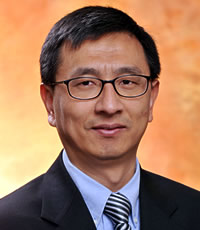Wei Yu, an assistant professor in TU’s Department of Computer and Information Sciences, recently received a $436,453 National Science foundation (NSF) Early Career Development (CAREER) Award for a project designed not only to advance scientific understanding of the impacts of cyber-attacks on smart grid operation and end users, but to help communities develop security countermeasures.
The Faculty Early Career Development (CAREER) Program is a foundation-wide activity that offers the NSF’s most prestigious awards in support of junior faculty who exemplify the role of teacher-scholars through outstanding research, excellent education and the integration of education and research within the context of the mission of their organizations.
Professor Yu directs the Cyber-Physical Networking System and Security Research Laboratory (CPNSS), which is based in the Department of Computer and Information Sciences. His research has focused on cyber-security, computer networks and cyber-physical systems.
The U.S. Department of Energy defines smart grid as “a modernized electrical grid that uses analog or digital information and communications technology to gather and act on information, such as information about the behaviors of suppliers and consumers, in an automated fashion to improve the efficiency, reliability, economics, and sustainability of the production and distribution of electricity.”
“The smart grid is a very large, complex system with a lot of uncertainty that can be raised by cyber-attacks,” Yu explains.
“Our project will address imminent and urgent threats that, if left unaddressed, will have a profound impact on the development of smart grid and other critical infrastructures.”
Through this five-year award, Yu will develop a theoretical framework to investigate the interaction between the cyber network and physical grid. He and his research team—which will include undergraduate and graduate students— will investigate the impacts of cyber-attacks on the smart grid and develop innovative responses to protect it. Minority students will be encouraged to participate.
Yu’s project will integrate research, education and outreach. The outcome will be incorporated into courses in advanced networking, network security and smart-grid security.
In making the award, the NSF noted that Yu’s research would “also train students and help with workforce reparation to protect our national critical infrastructure.”

